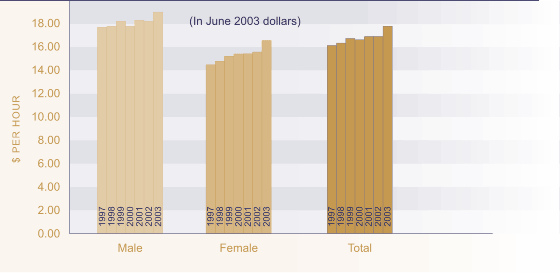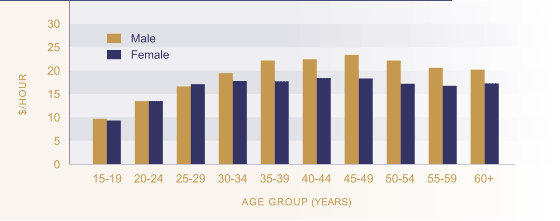Relevance
Average hourly earnings from wage and salary jobs is an indicator of the financial return to paid employment, independent of the quantity of hours worked.
Current Level and Trends
In June 2003, the average hourly wage of wage and salary earners was $17.82. Male employees earned on average $19.02 an hour from wage and salary jobs and female employees earned on average $16.57 an hour.
After adjusting for the effects of inflation, average hourly earnings increased by $1.66 per hour or ten percent in the six years to June 2003.
Figure PW3.1 Average hourly earnings from
wage and salary jobs by sex, June 1997 to June 2003

Source: New Zealand Income
Survey (1997 - 2003) Statistics New Zealand
Age and Sex Differences
Average hourly earnings from wage and salary jobs rise with increasing age to peak at 45-49 years. In June 2003, 15-19 year-olds earned $9.55 an hour on average from wage and salary jobs compared with $20.68 an hour on average for 45-49 year-olds. Real average hourly earnings for 15-24 year-olds increased by 6 percent between 1997 and 2003, which was less than the increase for older workers (11 percent for the 25-44 age group and 12 percent for the 45-64 age group).
In 2003, men and women below 30 years had similar average hourly earnings from wage and salary jobs. Men earned more per hour on average from wage and salary jobs than women in every five-year age group above 30 years. The increase in average hourly earnings over the six years to June 2003 was greater for female employees (14 percent) than for male employees (seven percent).
Figure PW3.2 Average hourly wage and
salary earnings by age and sex, June 2003 
Source: Statistics New Zealand,
New Zealand Income Survey
(1997 - 2003)
Ethnic Differences
Maori in wage and salary jobs earned $15.44 an hour on average in June 2003. This was less than European/Pakeha ($18.44 an hour) and more than Pacific people ($13.85 an hour). Wage and salary earners from other ethnic groups earned on average $17.65 an hour.
Over the six years to June 2003, increases in real average hourly earnings for Māori, at just below 12 percent, were similar to increases for European/Pakeha (11 percent) over the six years to June 2003. Over the same period, Pacific people and those from other ethnic groups experienced lower increases in average hourly earnings from wage and salary jobs (nine percent and ten percent, respectively).
